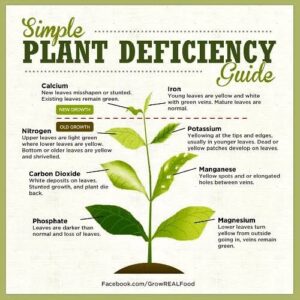Back to: Botany 200 Level
Hello, my brilliant student! How are you today? Have you ever seen a plant with yellow leaves, weak stems, or poor fruit development? Just like humans show signs when they are sick, plants also display visible symptoms when they lack essential nutrients. Understanding these symptoms can help farmers and gardeners quickly identify nutrient deficiencies and provide the right treatment. Today, we’ll learn how to recognise the symptoms of nutrient deficiencies in plants and why they occur.
Symptoms of Nutrient Deficiencies
Plants need different macronutrients and micronutrients to grow well. When any of these nutrients are missing, plants develop deficiency symptoms, which can be seen in the leaves, stems, roots, and fruits.

Macronutrient Deficiencies (Needed in Large Amounts)
Nitrogen (N) Deficiency
Symptoms:
Leaves turn yellow (especially older leaves first).
Stunted growth, weak stems.
Reduced flowering and fruit production.
Why? Nitrogen is needed for chlorophyll production (which makes leaves green).
Phosphorus (P) Deficiency
Symptoms:
Leaves turn purplish or reddish.
Poor root growth.
Delayed flowering and fruiting.
Why? Phosphorus is essential for energy transfer and root development.
Potassium (K) Deficiency
Symptoms:
Brown, burnt edges on leaves.
Weak stems and falling leaves.
Poor fruit development.
Why? Potassium helps in water balance and disease resistance.
Calcium (Ca) Deficiency
Symptoms:
Deformed, curled leaves.
Weak stems and rotting fruit (e.g., blossom-end rot in tomatoes).
Why? Calcium strengthens cell walls and root tips.
Magnesium (Mg) Deficiency
Symptoms:
Yellowing between leaf veins (while veins stay green).
Older leaves affected first.
Why? Magnesium is needed for chlorophyll production.
Sulphur (S) Deficiency
Symptoms:
Yellowing of young leaves.
Poor growth and delayed maturity.
Why? Sulphur is important for protein and enzyme formation.
Micronutrient Deficiencies (Needed in Small Amounts)
Iron (Fe) Deficiency
Symptoms:
Yellowing between veins of young leaves.
Slow growth.
Why? Iron is needed for chlorophyll formation and respiration.
Zinc (Zn) Deficiency
Symptoms:
Small leaves with short internodes (space between leaves).
Stunted growth.

Why? Zinc helps in enzyme production and growth hormones.
Manganese (Mn) Deficiency
Symptoms:
Pale green leaves with dark green veins.
Why? Manganese helps in photosynthesis and enzyme activation.
Copper (Cu) Deficiency
Symptoms:
Wilting and twisted leaves.
Poor flower and seed production.
Why? Copper supports enzyme activity and plant metabolism.
Boron (B) Deficiency
Symptoms:
Cracked, hollow, or misshapen fruits.
Poor root and flower development.
Why? Boron is needed for cell wall strength and fruit formation.
Molybdenum (Mo) Deficiency
Symptoms:
Yellowing of leaves.
Poor nitrogen absorption.
Why? Molybdenum helps in nitrogen metabolism.
Chlorine (Cl) Deficiency
Symptoms:
Wilting and leaf curling.
Poor growth and root development.
Why? Chlorine helps in photosynthesis and water regulation.
Why Do Deficiencies Occur?
Poor soil quality – Some soils lack essential nutrients.
Overuse of fertilisers – Too much of one nutrient can block others.
Soil pH imbalance – Acidic or alkaline soils can prevent nutrient absorption.
Excessive rainfall or drought – Too much or too little water affects nutrient availability.
Summary
Macronutrient deficiencies cause major problems like yellowing, weak stems, poor fruiting, and stunted growth.
Micronutrient deficiencies lead to issues like chlorosis (yellowing), poor enzyme function, and abnormal growth.
Deficiencies happen due to poor soil, wrong fertiliser use, pH imbalance, or extreme weather.
Evaluation
- What are the symptoms of nitrogen deficiency in plants?
- Why do plants with magnesium deficiency have yellow leaves?
- What happens when a plant lacks calcium?
- Name two micronutrients and their deficiency symptoms.
- How can farmers prevent nutrient deficiencies in crops?
Fantastic job! Now you know how to identify and prevent nutrient deficiencies in plants. Keep up the great work—Afrilearn is here to make learning easy and fun! See you in the next lesson!
